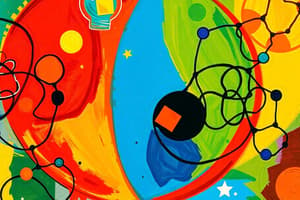Podcast
Questions and Answers
What is the main goal of science?
What is the main goal of science?
- To study historical events
- To explore new planets
- To solve global problems (correct)
- To create new technology
Which of the following is NOT a branch of science mentioned in the text?
Which of the following is NOT a branch of science mentioned in the text?
- Astronomy
- Biology
- Geology
- History (correct)
What is a key component of the scientific method?
What is a key component of the scientific method?
- Guessing randomly
- Ignoring observations
- Using only theoretical evidence
- Analyzing data and interpreting results (correct)
How does science contribute to society?
How does science contribute to society?
Why is it important for scientists to experiment in the scientific process?
Why is it important for scientists to experiment in the scientific process?
What role does science play in fields like medicine and environmental conservation?
What role does science play in fields like medicine and environmental conservation?
What is the specific chapter or lesson within Class 8 of the Hindi curriculum in India referred to in the text?
What is the specific chapter or lesson within Class 8 of the Hindi curriculum in India referred to in the text?
Why is it important to provide more specific information about the topic 'Basant'?
Why is it important to provide more specific information about the topic 'Basant'?
Which aspect of 'Basant' does the text highlight as crucial for generating a comprehensive article?
Which aspect of 'Basant' does the text highlight as crucial for generating a comprehensive article?
What would be the consequence of not providing additional details about 'Basant,' as mentioned in the text?
What would be the consequence of not providing additional details about 'Basant,' as mentioned in the text?
What hinders the generation of a comprehensive article without specific information on 'Basant'?
What hinders the generation of a comprehensive article without specific information on 'Basant'?
Flashcards are hidden until you start studying
Study Notes
Science is a systematic process of exploring natural phenomena and acquiring knowledge on how things in the physical world behave and function. It encompasses various branches such as biology, chemistry, physics, mathematics, astronomy, geology, and psychology. Each branch of science builds upon its own unique concepts, principles, methods, tools, terminologies, and theories.
Science operates through a specific set of practices, including observations, question formulation, hypothesis development, experimentation, data collection, analysis, interpretation, and communication—often referred to as the scientific method. These practices help scientists make sense of the natural world and develop explanations for their observed phenomena based on empirical evidence.
The importance of science lies in its ability to provide a better understanding of our world, improve quality of life, and solve global problems. By studying the natural world, scientists can lead advancements in fields like medicine, space exploration, environmental conservation, and more. Additionally, science fosters critical thinking skills and encourages individuals to ask questions, test ideas, and learn from mistakes.
However, it's essential to note that science itself does not produce ethically superior individuals, though science may provide us with the information necessary to act more ethically. As such, scientists must strive to apply ethical considerations when conducting experiments involving living organisms or humans and ensure that they contribute positively to society.
Despite its immense benefits, science faces numerous challenges worldwide, such as funding constraints, insufficient public awareness, and misconceptions about scientific findings. To overcome these obstacles, individuals, institutions, and governments must continually support and advocate for scientific progress and education.
Studying That Suits You
Use AI to generate personalized quizzes and flashcards to suit your learning preferences.




